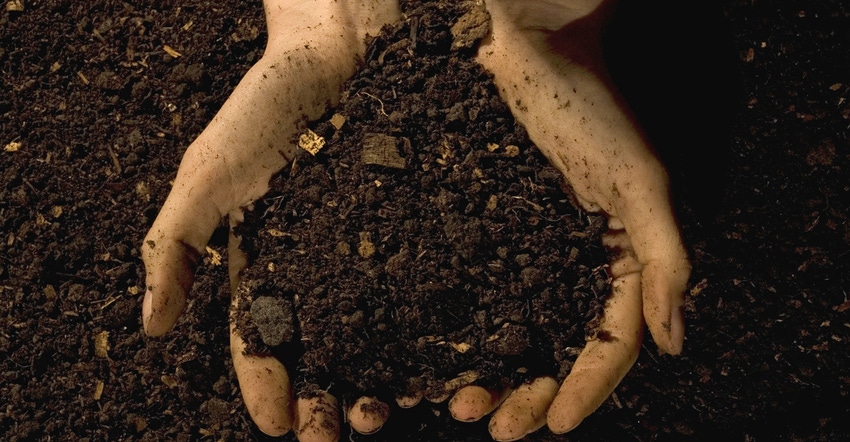June 23, 2022

To pass the time while stuck at home during the pandemic, many Americans took up new hobbies. People put together puzzles, made sourdough starters, brewed their own beer and exercised in record numbers.
Of all the ways they filled their free time, the most popular was gardening. First-time and seasoned green thumbs alike grew their own vegetables, spruced up their lawns and bought seeds for raised beds. The popularity of gardening shows no signs of slowing down nationally, with COVID-19 lockdown restrictions having eased.
Over the past year and a half, the Agricultural Utilization Research Institute (AURI) played a role in this by partnering with a Sauk Centre, Minn., business to develop renewable, all-natural and organic soil and gardening products. Later this year, Kristy K Organics will debut new fertilizer, compost and mulch — and the timing couldn’t be better.
“People have definitely started gardening more, and a lot of people became plant parents,” says Kristy Flowers, founder and manager of Kristy K Organics. "There are so many benefits with gardening, from being outside more to growing your own healthy food. It makes sense, and people have taken notice.”
Flowers and her husband, Jim, grew up on organic farms. Natural methods of growing plants, free from chemicals, have been a lifetime passion for both. They started their company with a desire to save the planet through the pursuit of sustainable environmental practices, and to introduce people to the benefits of natural gardening methods. Beautiful grass, vegetables and flowers can be created in an environmentally sustainable way. Kristy K makes its products with simple, all-natural elements.
Healthy soil treated with chemical-free fertilizer can continue to grow and capture carbon dioxide, keeping it out of the atmosphere and groundwater, Flowers says. According to Kristy K, feeding the soil beneath grass with beneficial, chemical-free fertilizer can potentially capture between 46 and 127.1 grams of carbon per square meter per year.
Help with product development
About 18 months ago, Flowers contacted AURI seeking assistance to develop the new products. Alan Doering, AURI’s senior scientist for coproducts, and Harold Stanislawski, AURI’s business development director, were assigned to the project. Doering and his team conducted analysis on new organic fertilizer, compost and mulch products. The organic compost is the “heart and soul” of the business, Flowers says. The company recently formed a partnership with a local chicken farmer to add manure pellets to the mix. They also produce products specifically for vegetable and flower gardening.
AURI’s scientists helped identify the right base products. To meet the standards for organic labeling, the new products must contain certain levels of nitrogen, phosphorus, potassium and other materials. Finding the right mix that is producible, affordable and available in bulk was the biggest challenge with this project, Doering says. Work for this project was conducted at AURI’s labs in Waseca, Minn., and Marshall, Minn.
Using the analysis from AURI, Flowers will be able to launch new mixes specifically for vegetable gardens and flower gardens. Currently, the company sells straight to consumers from its website. Flowers plans to make her products available at local businesses as she continues to expand, and as conditions in the global supply chain improve.
“We have always used our own recipes and formulas to make our products. One thing we always wanted was to work with a scientist to make sure the product was as healthy and environmentally friendly as we thought it was,” Flowers says. The biggest advantage of working with AURI, Flowers adds, was the organization’s access to equipment that she would otherwise not be able to use.
“Anytime we thought we hit a roadblock [during the testing], the team at AURI would talk us through the issue. To have that resource was very helpful,” she says.
In addition to testing and analysis for the organic fertilizer, AURI also provided guidance on labeling and general business questions. For example, Kristy K Organics has bagging equipment at their facility in Sauk Centre, and AURI worked with Flowers to increase efficiency and improve the process.
Flowers said she hopes to continue the working relationship with AURI. There is an opportunity to advise on pelleting, business networking and to help the company find new financing resources for additional equipment purchases. Her next goal is to produce an organic lawn fertilizer to sell in hardware and home and garden stores.
“That is where we think we can do the most and have the biggest impact,” she says. “People love the idea of a natural lawn fertilizer because they know it is safe for their kids and their pets. But consumers need to be able to afford it. That is what we are working on next.”
Learn more about Kristy K at kristykorganics.com.
Learn more about AURI at auri.org.
Source: Agricultural Utilization Research Institute, which is solely responsible for the information provided and is wholly owned by the source. Informa Business Media and all of its subsidiaries are not responsible for any of the content contained in this information asset.
You May Also Like




